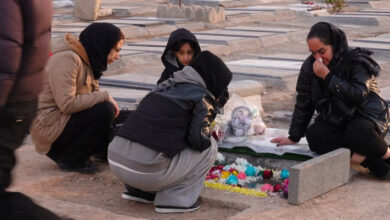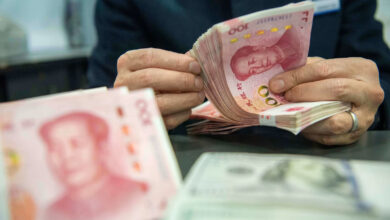When Mohamed Hassanein Heikal recently announced his suggestions for transferring power away from President Hosni Mubarak, it seemed to send ripples through stagnant waters.
Various types of protest movements showed an intense longing to introduce change and a determination to take practical, urgent steps in this regard. Extreme opponents, however, wholly rejected the initiative. Some said it is the regime testing the waters, while others accused Heikal himself of belonging to the regime. Others objected to the idea that change should pass through the presidential palace first in order to reach some sort of compromise. Some rejected certain details included in the initiative, while another group said that Heikal’s plan didn’t really introduce anything new. Several others, they say, had preceded him, citing the late Salah el-Din Hafez, who called for a meeting that would bring together 50 of Egypt’s most prestigious figures to find a way out of the crisis.
Supporters of the regime, on the other hand, seem to be launching a campaign with the sole purpose of raising doubts about Heikal’s initiative, regardless of whether such suspicions are at all founded in reality. The campaign started by pulling the wool over the people’s eyes and misleading them. Heikal himself was one of the main targets of that campaign. Some nameless national paper even stooped to the level of describing Heikal, often widely known as "the professor," as the “Barkash village madman.”
Additionally, the names Heikal suggested to form the Board of Trustees of the State and Constitution have all come under fire, with Amr Moussa, ElBaradei, and Zuweil topping the list. Their greatest sin is that the papers reiterated their names as possible nominations for presidency, even though none of the three did in fact announce himself as a candidate. The only figure who wasn’t insulted is General Omar Suleiman, General Intelligence Service chief and a pillar of the regime.
Evidently, the message is that the public should know that anyone who is not part of the regime is an outsider, even an outcast. As Amr el-Shobaky wrote recently in Al-Masry Al-Youm, the objective of the anti-Heikal campaign is to say that nobody should bother to launch an initiative for change in this country. In fact, it seems that the regime doesn’t want anyone to nominate himself for presidency or even suggest nominations, in order to create a false feeling that Egypt can’t produce new leadership. In such a state, Gamal Mubarak would rise as the only available alternative–the savior.
The fact that Heikal only mentioned names for seven of the 12 positions he suggests for the Board of Trustees of the State and Constitution now proves to be a blessing, because it has saved the rest from falling victim to a great deal of cruel irony.
Still, some of the criticism directed at Heikal was more serious and decent in tone. One of the opinions said that Heikal’s board members don’t share the same intellectual framework or a common historical experience to enable them to develop a vision of a state and constitution. That, however, implies that in order to outline such a new vision, there is a need for people who share a common intellectual framework. In other words, the neoliberal leaders of the National Democratic Party.
Mofeed Shehab made an amazing discovery when he revealed that Heikal had suggested some names, yet left out others. I also believe that Heikal should have included some young people, representatives of Christians (Naguib Sawiris, for example), and one or more women (Noha el-Zeiny, for example). Yet, if he had done that, Shehab would have said that Heikal was trying to impose certain figures on the people.
Others said that anyone who wants to participate in reform should belong to some party and that even though parties are deteriorating, change can’t come except through organized collective political activity. But that isn’t correct, because Yehia el-Gamal, whose name was mentioned as a member of Heikal’s proposed board, has been involved in partisan activity for a long time, though he ended up as an independent. Besides, who said that one is compelled to join a political party to participate in shaping the future of the country or otherwise accept complete exclusion from political life?
Let’s now move on to the list of nominations for presidency, who are the main targets of attack: ElBaradei, Ahmed Zuweil, and Amr Moussa. None of them have actually nominated themselves or even expressed a desire to run for presidency when asked by newspapers or encouraged by the youth on the internet.
Of course, none of these men is above criticism. When I was presenting my program Qalam Rasas in Dubai, I asked Amr Moussa, who is a friend and a colleague from school, to resign for reasons related to his performance as Secretary General of the Arab League. In the same program, I harshly criticized ElBaradei, who was at the time touring the region in a tour which I saw pointless. It isn’t in my character to be that cruel, nor does he deserve such cruelty. Despite that, I wonder why both of them have to come under fire just because their names came up as possible nominations for presidency.
In what way have those people disgraced themselves so that they may come under such systematic attack from the NDP? The three are a source of pride for any country! Zuweil is a unique breed of scientist, whose talent alone won him the Nobel Prize. The lectures he gives at the most prestigious institutions stand witness of his prodigious talent. He is also a consultant to the American president and an ever-welcome guest at presidential and royal palaces of the world. ElBaradei as well is a Nobel-prize winner, heads an organization that plays a critical role in the world, and has conducted highly complex political negotiations. He is also an expert in international law and an experienced politician, and he belongs to a family intensely involved in partisan activity. Amr Moussa’s history speaks for itself. It is enough to mention his nine-year mandate as foreign minister.
The three of them have strong presence and charisma. They are all highly organized thinkers, who master not only one language but various languages. In spite of all that many people, myself included, remain undecided. First, because they themselves haven’t decided whether to run for elections. Second, and most importantly, because we don’t know what their platforms are. And third, because the time for elections hasn’t yet come. But that should not force us to refrain from suggesting names for the presidency. In fact, presidential campaigns everywhere usually start two or more years before the date of the elections.
The opponents of reform are saying these people don’t have the right to be nominated because they don’t belong to a political party that is represented in the parliament, which the constitution stipulates as a prerequisite. This is true, but who could stop these Moussa, ElBaradei, or Zuweil from joining a party over the next year? Do they see this as an opportunity to slam parties that have no nominees ready for elections?
Haven’t we already come to the conclusion that parties are weak and dysfunctional? At the same time, though, we condemned the regime for the suppression it practices, and the “chronic” state of emergency it has imposed for 28 years, depriving Egypt of a normal political life.
What then? Some have argued, “It’s not enough to be prominent in a certain field in order to become president,” and, “Not just anyone could become supreme chief of the armed forces.” Some say, “We can’t be led by an imported president," or “The nominee should have participated in some war before.”
Fine, why don’t we then discuss all that in a serious, civilized manner in the interest of the country? Let’s not let the situation degenerate any further for some suggested nominees have been described as “sick clowns” or as figures “dying to be in the limelight.” Their possible nomination has even been seen by some as some form of “political extravagance,” as Aleyeddin Helal said in one of his statements.
We don’t even want to ask what these pundits mean by “political extravagance” because the objective of their campaign is plain as day. The objective is to bury all the icons of Egypt and to deter anyone from dreaming of presidency or even of coming any close to it. The goal is to kill the ambition of any citizen who is qualified to lead the country, so that the stage will be set for the NDP’s nominee. It won’t matter how scandalous the 2011 election will be with the NDP’s nominee “competing” against a carefully selected puppet. The goal is to have Gamal Mubarak inherit power after he has been chosen as the nominee. Both the prime minister and the leader of the Policies Secretariat, Hossam Badrawy, have declared this openly. Helal went as far as to say that the trend to allow inheritance of power started in 1952, though he knows that the succession of power was conducted according to the constitution, which brought President Mubarak himself to power.
In what field has Gamal Mubarak really stood out? And how popular is he if an opinion poll showed that only 12 percent of the NDP youth approve of him as president? What qualifications does he have to become armed forces chief? In what war has he participated? If you think that ElBaradei and Zuweil are imported, is Gamal Mubarak really made in Egypt?
Gamal Mubarak has neither been made in Egypt nor lives in the real Egypt. He’s an Egyptian citizen only in theory. In his visits, he has neither seen our people, nor treaded on our land. The roads are paved, and the cheering crowds are selected before he visits. Time to speak with him is limited, and his guards always surround him. Gamal Mubarak is a sanitized man, living in a shell of his own, with the other businessmen. He lives away from the people in presidential palaces. No wonder then that the youth are launching a campaign on the internet with the motto “And how well do you know Egypt, Gamal Mubarak?”
Translated form the Arabic Edition.




